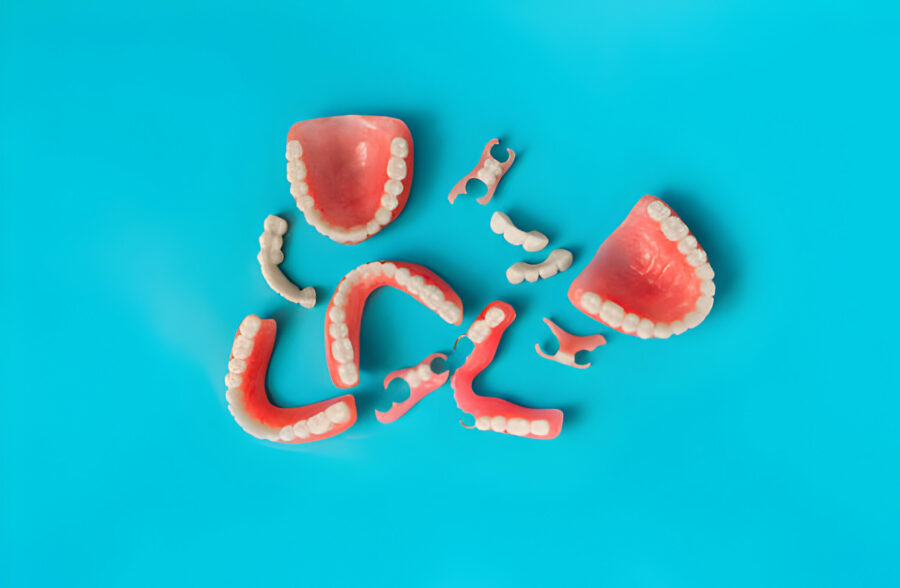Summary:
Dentures are removable orthodontic replacements for missing teeth and the tissues around them. There are two types of dentures: full and partial teeth dentures, and you can choose one based on your oral needs and requirements.
But how do you choose the right denture type from either of the alternatives? This can be a challenging decision that requires thorough deliberation and research.
So, to help our readers streamline the difference between the appliances, we’ve done the research to discover the differences using topics like:
- Understanding Full and Partial Dentures
- Differences Between Partial And Full Dentures
- How To Make The Right Choice Between Full And Partial Dentures?
- Effective Tips To Care For Dental Dentures
Continue reading as we learn more about the appliances in the following sections.
Introduction:
Tooth loss is a real issue preventing many from smiling or talking confidently. Numbers show one quarter (26%) of adults aged 65 or above have eight or fewer teeth.
But is there any solution to this crisis? Yes, and it is called dental dentures. These prosthetics can be very helpful in restoring your mouth’s functionality and giving you a killer smile.
There are two different types of appliances: full dentures and partial dentures. But which one do you need? Let’s find out!
Understanding Full and Partial Dentures

Dentures are dental prosthetics that help restore your smile and teeth if you miss a tooth or multiple teeth. Complete dentures are designed for people missing all their teeth. These denture styles have a plastic base designed to fit over your gums. The base is attached to a set of artificial teeth. This enables you to remove or wear your appliance based on your convenience.
On the contrary, partial dentures are designed for anyone with some natural teeth intact. These appliances fit around the existing cavity, and a precision attachment or metal clasps hold it in place. You can easily remove and wear half dentures based on cleaning needs and convenience.
Differences Between Partial And Full Dentures
Making the right choice between incomplete and full dentures is not always easy. However, taking a well-thought-out approach to the issue and analyzing the differences between both can go a long way.
You must get complete same-day dentures in Missouri only if all your teeth are missing for some reason or another. Incomplete dentures make better sense when missing a tooth or two. This is important since incomplete false teeth require support from your existing enamel to compensate for the missing tooth.
The overall procedure for getting partial dentures is simple and requires minimal invasion. This means you need not worry about getting oral surgery for incomplete dentures, making them an affordable alternative for many. It is also essential to consult your dentist and ask if you need full or partial dentures.
How To Make The Right Choice Between Full And Partial Dentures?
When it comes to making the right choice between full and partial dentures, there are many factors you need to account for. So, let’s check out these factors to help you make an informed choice based on your needs.
- Overall Oral Health: The first important factor you need to consider here is your overall oral health. If you have good oral health with some missing but existing solid naturals, then incomplete dentures might be the suitable alternative. But if you have any signs of gum disease and are missing multiple teeth, then a complete appliance might be a better option.
- Teeth’s Condition: The next important factor is your oral condition. It might be the best alternative if your existing natural teeth are strong enough to support a partial denture. But if your cavity has weaker roots, it is better to go for complete dentures instead of partial plate teeth.

- Budget: Expenses are one of the primary reasons why most people avoid oral health until things get worse. Hence, having a thorough idea of your budget will also influence your decision to get full or incomplete dentures. You must even consider checking the details in your insurance policy to determine if it covers denture treatments.
- Dental Consultation: The last but most important factor you must consider is what the Branson family dentist said about your oral health. You must visit a dentist and discuss your dental needs and budget. They will examine your oral condition and overall dental health to recommend the best alternative based on your needs.
Practical Tips To Care For Dental Dentures
Simply getting your full or replacement partial dentures is only sufficient if you know how to maintain them. Proper maintenance can significantly enhance your denture’s longevity, saving you the trouble of general wear and tear. So, here are some tips and suggestions to help ensure proper care for your dentures.
Retain Your Denture’s Shape
Never place your dentures in hot water when not in use since it can wrap them in no time. Instead, use a denture cleaner solution to soak your dentures when not in use to ensure it does not wear and retain their shape and structure.
Ensure Regular Cleaning
Dentures demand regular cleaning like your cavity. You must clean your appliance thoroughly to remove any unwanted food particles, bacterial growth, or tartar accumulation. You can even get many different types of denture cleaning solutions to clean them and get more use out of them.

Take Your Dentures Out Everyday
Most people remove their appliances every night while going to sleep and soak them in warm water or a cleaning solution. But if that is not an option, consider removing your appliance for at least five to eight hours daily at any other time. This is important to help your mouth tissues recover from the friction of everyday wear.
Determine If You Need Denture Adhesives
If your salivary glands do not produce enough saliva to hold the denture in place, you might need to use a denture adhesive. These adhesives are available in different forms, including creams, wafers, powders, and strips. You must ask your dentist if you need denture adhesives to hold the denture in place. If you do, remove the adhesive from dentures and partials before cleaning them.
Takeaway
- Dentures are dental prostheses that can restore your smile if you lose a tooth or several teeth.
- Complete false teeth are created for those who are missing all of their teeth.
- Incomplete false teeth are for those who still have some natural teeth.
- Still confused between partial and complete dentures? Visit our professionals at Branson Dental Centre to learn more about the treatment today!

